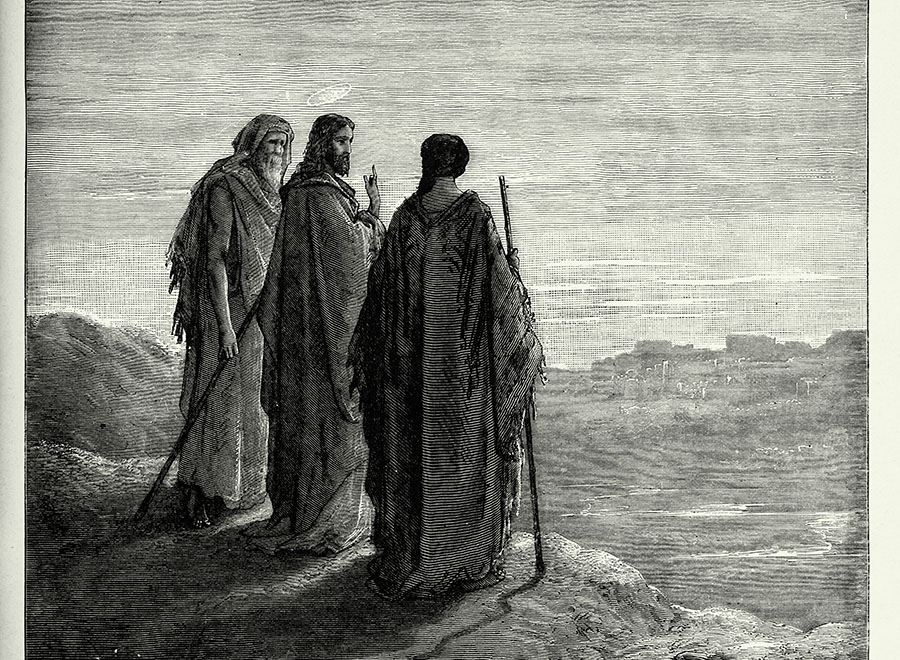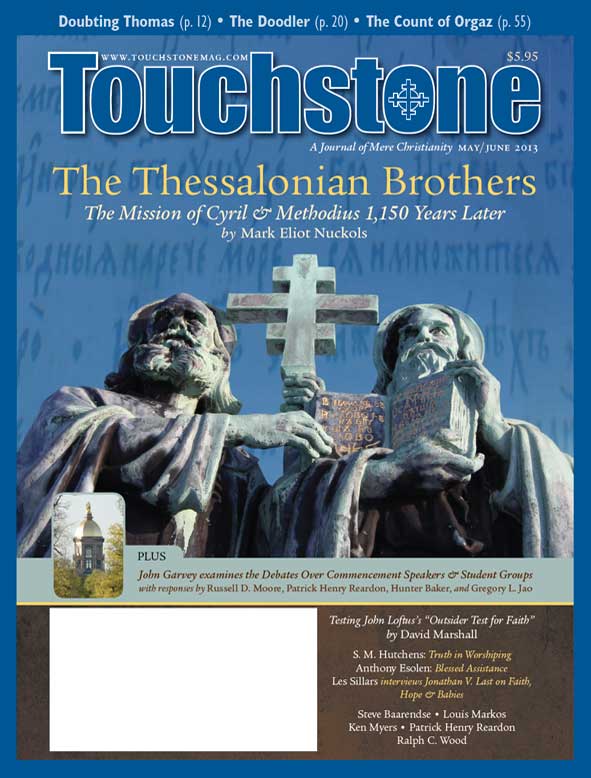Feature
Into All the World
Testing John Loftus's "Outsider Test for Faith" Shows Why There Are Billions of Christians Today
by David Marshall
As author of one of the first books rebutting the New Atheism, I've spent considerable time over the past several years in dialogue with atheists, including such quasi-luminaries as Hector Avalos, Richard Carrier, Jerry Coyne, PZ Myers, and Victor Stenger. Aside from atheists who also happen to be philosophers—who in my experience tend to argue more effectively—many seem to regard reason much as the young Augustine of Hippo saw chastity: "Lord, make me logical, but not just yet."
One New Atheist I have enjoyed talking with, though, is former pastor John Loftus, who has written and edited several books attacking Christianity. His signature argument is what he calls the Outsider Test for Faith (just published in March as a book of that title by Prometheus Press). In its simplest form, the "OTF" is the contention that Christians should be as skeptical about the faith in which they were (presumably) raised as they are about, say, Islam or Inca worship of the earth goddess Pachamama. He believes that if Christians dared to view their religion from an objective, outside perspective, they would abandon it in droves. So the OTF is also presented as an argument against Christianity.
Of course, this challenge is nothing new to observant Christians. News about Jesus captured the hearts of "outsiders" like Justin Martyr, Clement of Alexandria, and Origen precisely because it first met the needs of those who taught them, the "tutors to Christ" within Greco-Roman civilization, from the "inside." A century ago, G. K. Chesterton explained his own experience of the gospel by likening it to the story of an English sailor who "discovered" England under the misconception that he had landed on an island in the South Pacific. This experience, said Chesterton, combined the "fascinating terrors of going abroad . . . with all the humane security of coming home again."
That has been my experience, too. I have spent most of my adult life far from the Christian ghetto: in secular universities, Communist China, Buddhist Taiwan and Japan, post-Christian England, and swimming in a sea of ancient religious texts. I have also taken an academic interest in the process by which much of the world went from "outside" to "inside," that is, the history of Christian missions. Like Chesterton's sailor, the further I left Christendom behind, the more the facts seemed to bring me back to Christ.
A Four-Point Argument
But, as C. S. Lewis said, we need to be reminded more often than taught. I find Loftus's challenge a useful reminder to see how the gospel looks in the context of world religions. So let me describe his version of the OTF, then note some of its problems. I will argue that, far from merely being a rhetorical question, the test represents a grand experiment that has sifted human beliefs in numerous cultures over thousands of years. I'll then argue that Christianity has survived this sifting on the part of billions of passionately engaged "outsiders" because it finds purchase inside the human heart, transforming human traditions from within.
In The Outsider Test for Faith ([OTF] 15–17), Loftus summarizes his argument in four points:
1. The Religious Diversity Thesis: "People who are located in distinct geographical areas around the globe overwhelmingly adopt and justify a wide diversity of religious faiths due to their particular upbringing and shared cultural heritage, and most of these faiths are mutually exclusive."
2. The Religious Dependency Thesis: "To an overwhelming degree, one's religious faith is causally dependent on brain processes, cultural conditions, and irrational thinking patterns."
3. Therefore, it is "highly likely that any given adopted religious faith is false."
4. So, in practice, one should test one's religion "from the perspective of an outsider, a nonbeliever, with the same level of reasonable skepticism believers already use when examining the other religious faiths they reject."
Let's take these points one by one.
Examining the Premises
Loftus's first two points are premises. Point one, the assertion of a "wide diversity of religious faiths" sounds obvious, but proves on examination to be deeply ambiguous.
As Chesterton has noted, religions around the world commonly include four basic beliefs: in "God, the gods, philosophy, and demons." Peel away specific labels, and many beliefs could be recognized as universal or at least widespread. We could thus also posit the "lack of religious diversity thesis," and hold it in tension with Loftus's "diversity thesis."
Nor is Loftus's second premise as obvious as he makes it sound. Often, as he concedes, people adopt religions they were not taught as children. In most of the world, serious Christianity is not the default position. Moreover, Americans born into one religion often do rationally reevaluate their beliefs. Most American Christians go to secular schools, listen to secular music, watch secular movies, and (in extreme cases) read the blogs of John Loftus or PZ Myer. We lie, in more than one sense, at the bottom of that cataract of historical influence misleadingly called the "Enlightenment." So while cultural dependency on our "Christian" culture may be real, it is hardly "overwhelming."
Moreover, atheist worldviews seem as "culturally dependent" as any other. In The Christian Delusion [CD], an anthology he edited, Loftus claims that "atheists do indeed take the OTF. That's why atheists are atheists in the first place" (97). But in fact, people also "adopt and defend" skeptical ideologies because of where they were born and how they were educated.
In the fall of 2011, I surveyed 124 Chinese intellectuals, mostly in northern China, on their religious beliefs. Among college students who gave clear answers, about two-thirds avowed atheism. But those who had graduated from college were far more likely to identify themselves as believers of some sort—especially in Zen, Confucianism, or Christianity—with only one-third clearly choosing the "there is no God" option on my survey. So evidently, while Marxist propaganda succeeds in making young Chinese into atheists, for many, it only lasts until they leave school and test that propaganda in the real world.
Most atheists today have been raised and/or live in Communist countries, where denying religion is expected. In Western countries, many atheists are raised by unbelievers, while others convert under the tutelage of influential atheists.
Examining the Conclusion
Point three is a conclusion putatively drawn from the preceding two premises. But does it really follow from them? If we adopt certain beliefs because we have been taught them, does that really mean they are probably false?
Obviously not. My belief that the earth circles the sun is "culturally dependent." If I grew up in ancient Carthage, or among the Yali in Papua New Guinea, I would probably not believe it. I believe it because teachers have told it to me; I have never proven it for myself.
Loftus seems to be committing a version of the genetic fallacy here, the idea that the origin of an idea disproves it: "Mario is Italian, so of course he thinks olive oil is healthier than corn oil!" Maybe Mario's cultural bias does incline him to favor olives, but that doesn't mean olive oil isn't superior, or even that Mario doesn't hold his view for sound medical reasons.
Skeptics commonly reply, "But you don't have to take heliocentrism or the health benefits of olive oil on faith; you can prove them scientifically, unlike religion!" But who does? How do I know that electrons circle the nuclei of atoms? That the earth contains a core of iron and nickel? Or even that I have two lungs? If we had to prove everything for ourselves, we'd all toss our hands in the air, break off a tree branch, and go club a slow-moving marsupial for dinner. Not having to "prove everything scientifically" is one of the advantages of civilization.
At a Neolithic town site in the Fertile Crescent, archeologists found seeds from more than a hundred different plant species. Those seeds represent an ancient people's cumulative knowledge of edible plants, which they acquired through testing and the handing down of their results from generation to generation, ultimately paving the way for civilization.
Aristotle, one of the inventors of science, pointed out that it is rational to accept truth by attending to the "undemonstrated dicta and opinions of the skillful, the old, and the wise," who over generations have served as gatekeepers of truth in every tribe. Indeed, if his ancestors had not done that for millennia, Greek civilization could not have produced Aristotle.
The Historical Test
With Loftus's fourth point, rubber meets road. For Loftus, the OTF is a gambit by which to persuade Christians to cast a jaundiced eye at the gospel. On his blog, Debunking Christianity, he admitted this forthrightly:
We must offer [Christians] a shocking test, one that may help get them out of their dogmatic slumbers like nothing else can do. And they will object as strenuously as they can to the OTF because they know their faith does not pass that test. That's why Christians argue against it just like Muslim scholars would. (http://tinyurl.com/cpagj27)
But Christians don't need to "argue against" the OTF. Following Chesterton, they might instead ask skeptics to open the window, to sail to the South Seas, to take the history of religions more seriously, not less, and see how their test has fared in that context.
The first problem they'd encounter is empirical. Put crudely, religions have played a 3,000-year game of "Survivor" on a planetary scale, and Christianity has been voted onto the island of the human soul not once, but billions of times. Why have the promises of a powerless, penniless, first-century rabbi, preaching in what is now a dead language from a boat on an inland lake in a long-extinguished empire, been so spectacularly fulfilled?
Obstacles to Conversion
Christianity did not succeed because conversion is easy. A former imam studying for his doctorate at a major university told me how he became a Christian. He was the leader of a prominent mosque and an Islamic scholar successful enough to have been invited overseas to lecture. But one day, at the mosque, he heard the audible voice of God calling him to believe in Jesus. I asked if he, while still a Muslim, "would have approved of applying the death penalty to Muslims who converted to Christianity." "Of course!" he replied. Muslims find it hard to renounce the death penalty for infidels, at least in theory, because Mohammed himself approved and carried it out.
When I lived in Japan, our family often soaked in a mountain hot spring. Nearby was a series of pools, "hells" in Japanese, where Catholic Christians were once boiled alive. Christianity spread rapidly in Japan in the sixteenth century, an "outsider test" that Japanese authorities ended not with friendly persuasion, but with torture and mass murder.
Then there is social pressure, which is subtler, yet also effective. Before she became a Christian, my wife (then girlfriend) told me, "I feel I would be betraying my family, my culture, and my country." We like to "preserve our religious capital," write sociologists Rodney Stark and Roger Finke in Acts of Faith. They posit that, "under normal circumstances, most people will neither convert nor reaffiliate" (119).
Historically, many peoples had powerful incentives to reject Christianity. The new faith challenged much in Greek society—Homer, the idol industry, the Coliseum, the subservient status of women. Charlemagne cut down the Sacred Ash and killed Saxons who would not convert. French Crusaders "glorified God" by massacring inhabitants of Jerusalem. Spanish conquistadors brought the religious conflict of the Iberian Peninsula to the New World.
Sometimes, to be sure, power aided conversion. But more often, officious European power created a series of barriers for Asians, Africans, and Native Americans who might think about becoming Christians. Many non-Westerners protected their cultures by stigmatizing or even killing believers. "One more Christian, one fewer Chinese" expressed a feeling common to many cultures: that conversion required a kind of de-culturalization—drinking English whiskey, eating English beef, and going about "in European clothes, including a hat" as Gandhi put it (Autobiography, 30)—in effect, spitting on the graves of one's ancestors. If Christianity had not also often been seen as a friend to non-Western cultures in a deeper sense, it could hardly have spread as far as it has.
Into All the World
The message of Jesus arrived in Athens, the cultural capital of Greco-Roman civilization, in the person of Paul, a member of an unpopular ethnic minority. Athens famously overflowed with gods, mostly Greek, but also Egyptian deities and shrines to Roman emperors. Paul began debating followers of the philosophers Zeno and Epicurus in the city market, where the former's Stoic school had long ago been born. He was accused of "marketing foreign gods" and of "babbling."
He was invited to Mars Hill to explain himself. This was a forum where, according to Aeschylus, after the Trojan War, Apollo had defended the son of Agamemnon against the charge of murder, arguing for mercy before Athena, the city's patron deity, on the grounds that, "when a man dies, the earth drinks up his blood. There is no resurrection." Following a brilliant philosophical introduction, Paul told his esteemed audience about a Jewish preacher, for whose sake (based on claims of resurrection that Apollo had denied) he asked his hearers to "turn away" from the foolishness of idols. Most of his listeners scoffed at the story.
Yet some did believe. From such small beginnings, Christian believers had, by the time of Constantine, become a force to be reckoned with. By the time of Theodosius I (a.d. 347–395), most Greco-Romans claimed to be Christians. And over the next two millennia, the message Paul preached transformed wild northern Europe into the world's greatest civilization, spread across the Americas, reached hundreds of tribes in Africa and Australia, and reformed, in deep ways, the ancient civilizations
of Asia.
Nor has modernity halted its progress. A hundred years ago, there were few Christians in sub-Saharan Africa; now there are more than 400 million. In the past twenty years, some 60–90 million Chinese, and tens of millions of Indians, have taken the OTF, found that Christianity passed, and converted. Millions of contemporary Muslims have also prayed to Jesus, despite the dangers, and despite rivalry with the largely post-Christian West and natural attachment to their own ways and mores.
Is not this vast movement of hearts and minds over centuries and continents a more objective test of the Christian faith than the abstract mental exercise of an Indiana skeptic?
The Cinderella Test
Loftus compares choosing a religion to the scene in Cinderella in which the prince looks for the girl he danced with out of "45,000" who claim to have lost the glass slipper: "We would need to be skeptical of each claim and demand an empirical shoe fit before we should believe," he argues. Of course, one should ask tough questions about religious claims; no Christian philosopher suggests otherwise. Our claim is that we—and billions of others—have found a snug "empirical shoe fit" between the claims of the gospel and the real world.
We should, though, narrow down the test group from tens of thousands of religions to only those few that have already passed the Outsider Test, not as a Fairyland exercise, but on the proving grounds of cultures. Taking a broad definition of "religion," five faiths appear to have met the challenge to some extent: Buddhism, Christianity, Islam, Marxism-Leninism, and Secular Humanism.
Islam and Communism spread mostly by violent conquest. Like Star Trek's Borg, what Islam conquered, it mostly assimilated, its conquests being geographically contingent, dependent on the range of camels. Yet the success of both faiths does demonstrate the inherent credibility of their deepest claims: that God is one (Islam), and the call for justice for the poor (Marxism).
Buddhism and Secular Humanism, by contrast, spread mostly through persuasion. Buddhism is considered a great missionary faith, and it did, in some sense, capture the hearts of East Asians. But the forms of Buddhism that proved most popular owed little to the austere, self-help philosophy of the Indian Buddha. What really caught on was the aesthetic of Chinese and Japanese Zen—"in the chopping of firewood and the hauling of water, therein lies the wonderful Tao"—building on the cheerful wit of the Chinese humorist, Zhuang Zi. Pure Land Buddhism, which frankly sought a savior ("If you think of the power of Avalokitsvara, the ship will not be sunk by waves"), proved even more popular. Even so, by modern times few Chinese were serious Buddhists, because the faith repudiated family and Chinese dining customs (don't eat meat!), and rather than improving society and creating science, as the scholar Hu Shi complained, it "made Chinese society a tragedy" by encouraging contempt for human life through such practices as the public self-immolation of Buddhist monks, a sacrilege to parents in Confucian society.
Secular humanism does encourage science and social progress, arguably because it is watered-down Christianity, a weed that grows in fields plowed by the gospel.
So even on a simple historical level—the level of choices made by billions of passionate, intellectually engaged people, not meme-numbed robots—Christianity is one of just a few belief systems that can be said to have passed the OTF, and it has done so most spectacularly. Furthermore, in the face of natural hostility, it has been found credible by many of "the old, the wise, and the skillful" of numerous civilizations.
So really, the glass slipper is on the other foot. The real intellectual challenge is, how do skeptics explain the unique empirical success of the gospel?
Two False Explanations
Two New Atheists have offered explanations that defame the rationality of Christian conversion. In Sense and Goodness Without God, historian Richard Carrier suggests that, like Islam, Christianity "spread by the sword." But in fact, it usually did not. In response to Carrier's claim, I considered twelve great regions and periods in which Christianity spread most impressively: ancient Rome, the Nestorian Middle East, China from the early Tang Dynasty to the present, Medieval Europe, the Latin world, modern Europe, North America, Africa, India, Korea, the recent spread of Evangelical Christianity in Latin America, and hundreds of relatively isolated tribes around the world that have adopted
Christianity.
By the time Christianity was legalized by Emperor Constantine in a.d. 313, about ten percent of Romans had already become Christian, despite 300 years of persecution. Had Christianity simply followed the same growth path, the Roman Empire would have become mostly Christian by mid-century even without any political advantages.
Force was an important factor in the spread of Christianity during only two of the twelve periods: occasionally in Medieval Europe (as when Charlemagne "converted" the Saxons after defeating them in battle), and during the original, superficial conversion of Latin America. Christianity may have been opposed by force more often than it has spread that way. So Carrier's "explanation" simply doesn't hold water: the vast majority of converts have believed of their own volition.
In The Religious Virus,Craig James offers a more subtle explanation: that Christianity, having evolved in a competitive religious environment, acquired a set of adaptive traits, including the prestige and power of Western science, that made it a stronger competitor in local intellectual marketplaces:
Christianity was a highly evolved set of memes, filtered and improved by ten thousand or more years of the harshest meme competition in the history of the world. The aboriginal religions of places like the Pacific Islands, Australia and New Zealand never had a chance (169).
But the environment in which beliefs flourish or fade is the human mind. Minds sort ideas by plausibility. Like all forms of what C. S. Lewis called "Bulverism," patronizing talk about "memes" can just as easily be turned against skeptics: you are not people who think about ideas, accepting some and rejecting others because you find them valid or fallacious; you are merely unwitting "hosts" to "memes," which act on you like body-snatching pods.
No Zero Sum Game
James also takes a fundamentally false zero-sum understanding of religions for granted. What is wanted is not one rigid system that overwhelms all prior beliefs held by the "skillful, old, and wise" of every culture—which I think better describes the New Atheist vision of the future—but a universal belief that embraces the insights of many traditions.
Loftus makes the same fatal mistake in his philosophy of religions: "At best there can only be one true religion in what we observe to be a sea of hundreds of false ones" (CD, 99). As a former pastor, Loftus ought to know better. The first premise of Christianity is that Judaism is true. Jesus said, "Don't think I've come to abolish the Law and the Prophets. I have come not to abolish, but fulfill" (Matt. 5:17). This principle can be extended, to some extent, to the deepest truths in other spiritual traditions as well.
In general, a good theory is not one that completely displaces prior theories, but that incorporates what truth can be found in them. Kepler didn't refute the idea that the planets revolve around the sun, but explained better how they revolve. Einstein didn't render Newton's model of gravitation null and void; he showed that it was a special case, still useful for everyday observation. Indeed, Loftus himself recognizes this: "New paradigms do not completely overthrow the old ones" (OTF, 111).
When I tried to explain this, Loftus challenged me: "Maybe (David) can show us someone who was raised in a tribal religion in Africa who had no outside influence on him from another culture (i.e., no Mormon missionary) who became a right wing Christian Republican?"
Irrelevant political jibes aside, the substance of this challenge is easily met. Yale historian Lamin Sanneh notes that when missionaries came to Africa, they "began with a methodical inquiry into the nature and character of God among Africans, and before long it was obvious Africans had a deep sense of the reality of God" (Translating the Message, 158). John Mbiti describes African perceptions of God that agree with what the Bible says about him in rich detail. Millions of Africans believed in God, sin, the spirit world, life after death, and sacrifice for sins before they ever laid eyes on a Bible. This is but one reason why hundreds of millions of Africans overcame the stigma of believing an "outside," even an "imperialist," religion: Jesus came to fulfill, not destroy, the most fundamental foundations of African religion.
The same is true of the Pacific Islanders that James mentions. Many Polynesians already believed in God, whom some called Io, and who some say prepared Hawaiians for the gospel. (Only the Hawaiian upper class was allowed to worship him, though; the gospel expanded the franchise.)
In Christian thinking, religion is not a zero-sum game. World religions are not like so many fruits in the market, from which (having just one dollar) you must choose a single item, which is true, and leave the rest, which are totally false. That is a singularly narrow way of thinking. Evil and falsehood are present in every tradition, but God "has not left himself without a witness"
as well.
Awareness of God
On his blog, Loftus also amusingly accused me of lapsing into liberalism:
David has a bit more enlightened view of religion than people held to in previous centuries. Bloodthirsty wars were fought over them, and there's a lot of killing going on today because of them too. I find it utterly ignorant though, for someone like David to think he can stand up in the midst of a stadium filled with religionists to tell them all: "Hey, I've got the answer. We don't need to choose between Yahweh, Elohim, theos, Allah, and Shang Di, or Xenu, Thor, Odin, and the thousands of dead gods. . . ." I only ask where David's enlightened view comes from and how far is he willing to take it? It doesn't come from the Bible, that's for sure. (http://tinyurl.com/comv7ha)
Actually, I have stood up in biblical churches around the world, of many denominations, and argued that "pagans" in other cultures recognize God by many names. One doesn't need to choose between "Yahweh, Elohim, theos, Allah, and Shang Di": the one only-existing Creator God is commonly recognized under many aliases. And I quote the Bible itself to make my case, because that is, indeed, where I got the idea. In perhaps the most dramatic passage of Acts, Paul stood on Mars Hill and cited several Greek thinkers: "As some of your own poets have said, 'In him we live and move and have our being. . . . We also are his offspring.'"
Paul refers to two Greek words for God here: first, theos, which Loftus mentions. And a poem he refers to is by Aratus, and is written to Zeus. As Paul surely knew, Stoics and other Greek thinkers had been talking about God in a serious way for centuries by this time, as described in Cicero's On the Nature of the Gods, and in the Stoic philosopher Cleanthes' Hymn to Zeus, which Paul may also have been citing. ("Most glorious of the immortals, invoked by many names, ever all-powerful, Zeus, the First Cause of Nature, who rules all things with Law . . . from you we have our being, we whose lot it is to be God's image, we alone of all mortal creatures that live and move upon the earth.")
Even Carrier, in a chapter Loftus edited, recognizes that Greek thinkers were "motivated to pursue scientific inquiry" by their pious belief in "a Creator who had intelligently ordered the cosmos," the study of whose works honored God (CD, 407). A millennia and a half later, Mateo Ricci told the Chinese literati (I join two quotes here): "After closely studying your ancient scriptures, I found that the great men of old revered Shang Di, the High Sovereign of Heaven and Earth . . . whom we call Deus."
Loftus dismisses evidence of God in other cultures:
Similarities show nothing except that concepts of god have gravitated toward monotheism because such a concept is a simpler one. This again is how religions evolve. They either evolve or die. . . . As people became more aware of other city-states their god had to encompass their religions too. So god concepts grew bigger as the world got bigger. (http://tinyurl.com/cvubcvs)
This is based on a false and outdated theory of anthropology. Looking at the big picture, God has not evolved at all. Peoples in Africa, Australia, Asia, and the Americas who lived the most primitive lifestyles were often the most aware of God, understanding him very much as the Bible does.
Loftus recently replied that "none of these Christian writers" (philosophers Victor Reppert and Thomas Talbott, along with me) "believe in Allah . . . because Allah revealed himself in the Koran" (OTF, 41). But that confuses belief in a being with belief that that being took a particular action. Arab Christians call He Than Whom No Greater Can Be Conceived "Allah," even if they doubt he spoke to Mohammed.
Fulfillment in Jesus
Of course, residents of Athens and Beijing had not heard of Jesus—which is why Paul and Ricci came and brought "Good News." But even there, just as the Jews spoke of a Messiah, a Son of David whose influence would go to the end of the world, and of a Suffering Servant who would "see the light of life" after suffering to redeem mankind, so locals sometimes recognized that Jesus fulfilled archetypes and prophecies given by Plato, Homer, Confucius, Lao Zi, Mencius, and some Vedic and Zhou texts.
In this view, the deepest truths in each great tradition find themselves not only fulfilled but also strengthened in Jesus, who "takes away the sin of the world" in a collective, social sense as well as for individuals.
Christianity affirms, with Islam, that there is one God, and that he sends prophets to teach us how to live. The Koran even names the greatest of those prophets: Jesus—not Mohammed—the "Messiah" and the "Breath of God." But what can we say to the girl from Saudi Arabia who told me, "I'll only go back to Saudi in a body bag?" Jesus also showed a compassion for women that changed the world, and needs to change Islam today.
Ancient Hindus recognized the centrality of a divine sacrifice. India later descended into the caste system and the burning of widows on funeral pyres, until the gospel prompted reform.
Buddhists recognized the importance of compassion. Lao Zi wrote of the power of weakness to overcome strength, and of a Sage who incarnates the Way and is "lord of the sacrifice." Confucian texts spoke of a great God who rules over humanity. Confucius also looked to a future "Holy Man" who would benefit all the peoples of the world. His greatest disciple, Mencius, prophesied that the Sage would appear 500 years after Confucius, just as the Diamond Sutra prophesied a transcendent Buddha to come 500 years after Siddhartha—bringing us to the day a Galilean fisherman asked a friend to "come and see" a perspicacious new rabbi.
If you're an atheist, you have to believe that most of what people in every civilization have always believed is mainly wrong. The gospel, on the other hand, digs deep into the heart of tradition and reveals forgotten and overlooked truth, bringing it out into the open, and invigorating it with new life.
The West took hundreds of years to come to faith. With all the trouble European imperialists have given the rest of the world, give the Chinese and Indians time to mull things over, like a mustard seed that grows into a tree and gives shelter to many birds, to which Jesus compared the kingdom of heaven. Tens of millions are already responding.
Christianity Affirmed
The first people to accept the gospel were Jews who saw Jesus as the fulfillment of hopes that their race had held for centuries. They were, in fact, both "insiders" and "outsiders" in relation to Christianity. As Jesus said, he came not to abolish the Law and the Prophets, but to fulfill them.
What about the first Gentile Christians? People like Justin, Clement of Alexandria, Origen, Eusebius, and Augustine were clearly "insiders" in relation to Greco-Roman tradition. Yet much within their own culture—theism that had grown popular; the heroic example of Socrates, who willingly died for truth; the heroic teachings of the Stoics; the "altar to the Unknown God" Paul found while exploring Athens; even the figure of Odysseus, like Jesus (said Clement of Alexandria) tied to the mast to pass the sirens and bring his ship home—encouraged Greeks and Romans to trust in Jesus.
Can you best tell the value of a house from inside, or outside? Both perspectives, of course, are important. You want to check its foundation, look for sag in the roof, check for water stains on the ceiling, or holes in the linoleum. You also observe how the house sits on its site, and whether the neighbors are the sort you'd borrow a cup of sugar from or call the police on at 3:00 a.m. To appreciate the value of Christianity, it does help to go outside it, either historically (by studying what Christianity fulfilled and changed in the ancient world) or geographically (by getting to know other traditions).
So while I think Loftus formulates and uses it wrongly, I approve of the Outsider Test for Faith. I think Christianity is affirmed by this test in four ways:
1. By the test of history: In a straightforward sense, Christianity has attracted more believers from more ethnic and cultural groups than any other religion. This doesn't prove Christianity true, as Loftus has represented me as saying. But if the OTF shows anything empirically, it shows that Christianity must possess remarkable plausibility to have convinced so many people in so many cultures to risk so much to follow Jesus.
2. By the test of prophecy: From early Genesis to the end of Revelation, the Bible is abuzz with predictions that the Good News will spread to the "ends of the earth." Those hundreds of prophecies have demonstrably and remarkably (if you think about how improbable they must have seemed on a remote hill in the Levant, or on a fishing boat on the Sea of Galilee) come true.
3. By the test of effect: In Genesis 22, God tells Abraham, "All the peoples of the earth will be blessed through your seed." This, too, has palpably come to pass, with the movement Jesus started educating, healing, elevating the status of women, kick-starting modern science, even (sociologist Robert Woodberry shows) spreading the institutions of civil society that provided the basis for democracy around the world.
4. By the Insider–Outsider Test: Christianity embraces deep insights known to such as David, Isaiah, Socrates, Plato, Zeno, Epictetus, Confucius, Lao Zi, and others. The gospel also fulfills archetypes and prophecies, preeminently in the Jewish Scriptures, but also including specific prophecies among Gentile writers who somehow foresaw such a Savior.
Seek & Look Again
Looking in at Christendom from the outside, of course, is nothing new. We've already noted Chesterton's imaginary trip (back) to England a century ago. So in conclusion, let me repeat the version of the "Insider-Outsider" test I wrote in Jesus and the Religions of Man, six years before John Loftus formulated his useful gimmickry:
What should a Christian say to an idealist setting out on a journey? Seek the good in every spiritual tradition and cherish it; but don't be naïve. Allow yourself to become desperate enough to be heretical, and even desperate enough to be orthodox. Give credit where credit is due, but also blame where blame is due. Take ideals seriously enough to live by, even die for. But be careful to whom you open your heart. Follow each star to the place where it leads. Then come and look again in a town called Bethlehem.
What is it you are looking for? Look, then, for a god among the gods of humanity. Look for a guru among the gurus of humankind at whose feet to find enlightenment. Wear tennis shoes out upon the holy hills of the Incas. Shake clouds of dust from ancient manuscripts of the sacred libraries of Lhasa and Alexandria. Ponder every sect, tribe and teacher from Tierra Del Fuego to Tibet. Then come, open the New Testament. Look again at the life and teachings of the man who said of the Jewish writings, "You investigate the Scriptures, because you suppose you have eternal life in them, and they bear witness to me" (John 5:39).
David Marshall is the author of several books, including most recently, How Jesus Passes the Outsider Test: The Inside Story (Kuai Mu Press, 2015). He blogs at christthetao.blogspot.com.
subscription options
Order
Print/Online Subscription

Get six issues (one year) of Touchstone PLUS full online access including pdf downloads for only $39.95. That's only $3.34 per month!
Order
Online Only
Subscription

Get a one-year full-access subscription to the Touchstone online archives for only $19.95. That's only $1.66 per month!
bulk subscriptions
Order Touchstone subscriptions in bulk and save $10 per sub! Each subscription includes 6 issues of Touchstone plus full online access to touchstonemag.com—including archives, videos, and pdf downloads of recent issues for only $29.95 each! Great for churches or study groups.
Transactions will be processed on a secure server.
more on christianity from the online archives
more from the online archives
calling all readers
Please Donate
"There are magazines worth reading but few worth saving . . . Touchstone is just such a magazine."
—Alice von Hildebrand
"Here we do not concede one square millimeter of territory to falsehood, folly, contemporary sentimentality, or fashion. We speak the truth, and let God be our judge. . . . Touchstone is the one committedly Christian conservative journal."
—Anthony Esolen, Touchstone senior editor












